
“The concern is: what happens when we run out of people like that?” asked Marc Palmer, brand insight director at Auto Trader UK. He was speaking in a panel discussion on pathways to electrify road transport at the 4th London EV Show.
He voiced the concern that low-income households might be left behind by the EV revolution. There is currently a problem for people whose only option is public charging: “It’s really expensive,” Palmer said. “If you rely on it, it is more expensive than having a petrol car. Why do that?”
Also, Auto Trader’s research has shown that women can feel excluded from the debate about EVs – despite being a demographic which is broadly sympathetic to worries over climate change, and therefore understands the value of decarbonization. The conversation can be “techy, blokey, angry”, says Palmer. Therefore many women decide “it’s not for them”.
“We’ve had early adopters, that’s the easy bit,” said Charlotte Patch, head of electrification of heat and transport strategy, Ofgem. “The next stage will be more challenging.” People who solely use public charging points – rather than charging at home and topping up at a service station – “is a very different type of consumer”.
She said the role of newer developments such as Vehicle to Grid had the potential to help here by changing the way the debate is framed. “An EV is also a battery on wheels,” she pointed out. “Obviously it’s a nascent technology at the moment, but you can see that coming.”









